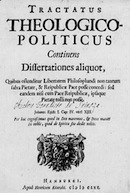
Source: Theologico-Political Treatise - Chapter IV - of the Divine Law
Spinoza's Chapter 4. – of Laws, man-made and natural (Page 1)

To begin Spinoza defines Law as that which persons and all things act in accordance to, either because of natural necessity or human decree. The latter might be better called an ordinance. It is laid down by men for themselves in order to live more safely. As an example of natural law he describes the conservation of momentum when one body impinges on another. The loss of motion of one body is communicated to the other by natural necessity.
In his philosophy he says that all things are predetermined by universal natural laws and operate in a given, fixed, and definite manner but human laws do not. This predetermination or how things are linked together are rarely known to us and so it is natural to think of events as being contingent, that is unconnected.
Comment:
This language makes of Spinoza a determinist. If a stone passing through the air could think it would believe it was in free flight never knowing the hand that threw it.